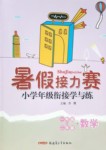题目内容
If we a full preparation, the meeting wouldn't have been so successful.
A.haven't made B.wouldn't make
C.didn't make D.hadn’t made
D
【解析】
试题分析:考查虚拟语气:句意:如果我没有充分准备,会议就不会这么成功。动作是和过去相反,if条件句用过去完成时,主句是wouldn’t have done。选D。
考点:考查虚拟语气
点评:本题所考查的if非真实条件句的虚拟语气,要记住和不同的时间相反的情况,主从句的时态不一样,做题时要结合具体时间判断。

 桃李文化快乐暑假武汉出版社系列答案
桃李文化快乐暑假武汉出版社系列答案 优秀生快乐假期每一天全新寒假作业本系列答案
优秀生快乐假期每一天全新寒假作业本系列答案 暑假接力赛新疆青少年出版社系列答案
暑假接力赛新疆青少年出版社系列答案Peter and his seven-year-old sister ,Kate , were at the same school. Not long after his tenth birthday Peter was entrusted to take her to school.
It was only two stops down the road , but the way his parents kept going on about it , you might have thought Peter was taking Kate to the North Pole . He was given instructions the night before. When he woke up , he had to listen to them over and over again. He was to keep hold of Kate’s hand at all times , sit close to the front nearest the window , and tell the bus driver the name of his stop.
Peter repeated all this back to his mother and set out for the bus stop with his sister. They held hands all the way. Actually he didn’t mind this but simply hoped that none of his friends would see him holding a girl’s hand. The bus came. They got on and sat close to the front. It was ridiculous sitting there holding hands and there were some boys from school there, so they let go of each other.
Peter was feeling proud of himself. He could take care of his sister anywhere. If they were alone tighter on a mountain pass and came face to face with a pack of hungry wolves, he could know exactly what to do. Taking care and not to make sudden movement, he would move away with Kate until they had their backs to a large rock. That way the wolves would not be able to surround them.
Then he takes from his pocket two important things—his hunting knife and a box of matches. He takes the knife from its sheath(鞘) and sets it down on the grass, ready in case the wolves attack. They’re coming close now. They’re so hungry and are watering and growling (咆哮). Kate is crying, but he cannot comfort her. He knows he has to concentrate on his plan. Right at their feet are some dry leaves and twigs. Quickly and skillfully, Peter gathers them into a small pile. The wolves are edging closer. He has to get this right. There’s only one match left in the box. He bends down, cups his hand and lights the match. There’s strong rush of wind. The flame flickers, but Peter holds it close to the pile and then first one leaf, then another, then the end of a twig catch fire, and soon the little pile is burning. He piles on more leaves and twigs and larger sticks. The wolves are backing off. Wild animals are terrified of fire. The flames are leaping higher and the wind is carrying the smoke right into their jaws. Now Peter takes holds of the hunting knife and …
Ridiculous! A daydream like this could make him miss his stop if he wasn’t careful. The bus had come to a halt. The kids from his school were already getting off. Peter leaped to his feet and just managed to jump to the pavement as the bus was starting off again. It was more than fifty yards down the road when he realized he had forgotten something. Was it his backpack ? No. It was his sister. He had saved her from the wolves and left her sitting there. For a moment, he couldn’t move. He stood watching the bus pull away up the road. “Come back,” he murmured, “Come back.”
【小题1】Which of the following is true according to the passage?
| A.Kate didn’t know their destination at all. |
| B.Peter and Kate missed their stop in the end. |
| C.Peter is thought to take Kate to the North Pole. |
| D.Mother asked Peter to hold Kate’s hand all the way. |
| A.Peter and Kate let go of each other |
| B.Peter was told instructions twice |
| C.Peter recited the instructions to his mother |
| D.Peter managed to avoid meeting his friends |
a. gather dry leaves and twigs into a small pile
b. take out his hunting knife and matches
c. light the leaves and twigs
d. move carefully with back to a rock
e. attack wolves with knife
f. strike a match
g. pile more leaves and sticks
| A.d-b-f-c-a-e-g | B.d-b-a-f-c-g-e | C.B-f-a-g-c-e-d | D.A-g-b-c-f-e-d |
| A.Peter felt anxious and helpless when the bus left. |
| B.Peter succeeded in fighting against wolves. |
| C.Kate would be absent from school that day. |
| D.Peter brought hunting knife and matches with him. |
The $11 billion self-help industry is built on the idea that you should turn negative thoughts like "I never do anything right" into positive ones like "I can succeed." But was positive thinking advocate Norman Vincent Peale right? Is there power in positive thinking?
Researchers in Canada just published a study in the journal Psychological Science that says trying to get people to think more positively can actually have the opposite effect: it can simply highlight how unhappy they are.
The study’s authors, Joanne Wood and John Lee of the University of Waterloo and Elaine Perunovic of the University of New Brunswick, begin by citing older research showing that when people get feedback which they believe is overly positive, they actually feel worse, not better. If you tell your dim friend that he has the potential of an Einstein, you’re just underlining his faults. In one 1990s experiment, a team including psychologist Joel Cooper of Princeton asked participants to write essays opposing funding for the disabled. When the essayists were later praised for their sympathy, they felt even worse about what they had written.
In this experiment, Wood, Lee and Perunovic measured 68 students’ self-esteem. The participants were then asked to write down their thoughts and feelings for four minutes. Every 15 seconds, one group of students heard a bell. When it rang, they were supposed to tell themselves, "I am lovable."
Those with low self-esteem didn’t feel better after the forced self-affirmation. In fact, their moods turned significantly darker than those of members of the control group, who weren’t urged to think positive thoughts.
The paper provides support for newer forms of psychotherapy (心理治疗) that urge people to accept their negative thoughts and feelings rather than fight them. In the fighting, we not only often fail but can make things worse. Meditation (静思) techniques, in contrast, can teach people to put their shortcomings into a larger, more realistic perspective. Call it the power of negative thinking.
【小题1】What do we learn from the first paragraph about the self-help industry?
| A.It is a highly profitable industry. |
| B.It is based on the concept of positive thinking. |
| C.It was established by Norman Vincent Peale. |
| D.It has yielded positive results. |
| A.Encouraging positive thinking many do more harm than good. |
| B.There can be no simple therapy for psychological problems. |
| C.Unhappy people cannot think positively. |
| D.The power of positive thinking is limited. |
| A.You are not taking his mistakes seriously enough. |
| B.You are pointing out the errors he has committed. |
| C.You are emphasizing the fact that he is not intelligent. |
| D.You are trying to make him feel better about his faults. |
A. It is important for people to continually boost their self-esteem.
B. Self-affirmation can bring a positive change to one’s mood.
C. Forcing a person to think positive thoughts may lower their self-esteem.
D. People with low self-esteem seldom write down their true feelings.
Section C.
Directions: Read the following text and choose the most suitable heading from A-F for each paragraph. There is one extra heading that you do not need. (请注意题号,将答案填涂在答题卡相应的位置)
“Can I see my baby?” asked the happy new mother. The bundle was placed in her arms and when she moved the fold of cloth to look upon his tiny face, she gasped—the baby had been born without ears. Time, however, proved that the baby’s hearing was perfect except his appearance.
One day when he rushed home from school and threw himself into his mother’s arms,he cried out bitterly,“A boy, a big boy…called me-a f—…freak.”She sighed, knowing that his life was to be endless of heartbreaks.
He grew up,handsome for his misfortune.A favorite with his fellow students, he might have been class president, but for that.He developed a gift for literature an d music.
d music.
The boy’s father had a talk with the family doctor.Could nothing be done? “I believe we could graft on a pair of outer ears,if they could be donated,”the doctor decided.So the search began for a person who would make such a sacrifice for a young man.Two years went by.Then, “You’re going to the hospital,son.Mother and I have someone who will donate the ears you need.But it’s a secret,” said the father.
The operation was a brilliant success.His talents blossomed into genius.School and college became a series of successes.Later he married and entered the diplomatic service.“But I must know!” he urged his father.“Who gave so much for me? I could never do enough for him.”
“I do not believe you could,” said the father,“but the agreement was that you are not to know…not yet.”The years kept the secret, but the day did come …one of the darkest days that ever passed through a son.He stood with his father over his mother’s casket(棺材).Slowly and tenderly,the father stretched forth a hand and raised the thick,reddish-brown hair to let out the secret.
【小题1】.
When the mother unfolded the cloth and looked upon the tiny face we know that the mother________.
| A.suddenly decided to make a sacrifice for the baby |
B.kept the baby’s situation unknown to other s s |
| C.felt shocked and disappointed to see her new baby |
| D.complained of her bad luck and regretted having a disabled child |
Give t
 he closest meaning to the underlined word “freak” in Paragraph 2.
he closest meaning to the underlined word “freak” in Paragraph 2.| A.Slow–acting person. | B.Ugly–looking child. |
| C.Badly–behaved student. | D.Strangely–shaped creature. |
At last, we may infer from the passage that_________.
| A.The agreement was between the donator and the family |
| B.Finally the boy came to know the donator was a stranger |
| C.The mother may never let her hair be cut to keep her ears from being seen |
| D.The mother donated her ears to her son after she died |
What moral lesson can we draw from this reading?
| A.Real love lies in what is done unknown rather than what is done known. |
| B.It is up to parents to help their children heart and soul. |
C.True beauty lies only in the heart not in appearance. beauty lies only in the heart not in appearance. |
| D.It is a virtue for young generations to learn to be grateful. |
